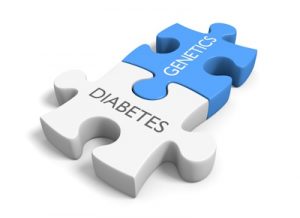 Adults with a deletion involving SH2B1 develop early type 2 diabetes which is difficult to treat.
Adults with a deletion involving SH2B1 develop early type 2 diabetes which is difficult to treat.
In a paper published in the journal Cell Reports Medicine, we studied a part of chromosome 16 called 16p11.2 which can be deleted in people with obesity and/or learning difficulties. A small deletion on this chromosome (often referred to as BP2-3) has been reported previously in children with early-onset obesity, by our team and others (Bochukova et al Nature 2010 ). The deletion encompasses 9 genes, including SH2B1 which is important for signalling by insulin, which regulates blood glucose levels and leptin which regulates body weight.
Studying 700.000 participants in the UK Biobank and the Estonian Biobank, the Cambridge team together with Alexandre Reymond and Zoltán Kutalik from the University of Lausanne, found that adults with the BP2-3 deletion have an increased risk of obesity, type 2 diabetes and associated complications such as renal failure. Compared to BMI matched controls, deletion carriers had type 2 diabetes which was particularly difficult to treat, with poor glycaemic control despite the use of several glucose lowering medications. These findings suggest that people with this deletion should be monitored for metabolic disease progression and may benefit from targeted treatments. As SH2B1 is involved in leptin signaling, people with this deletion are eligible for inclusion in Phase 3 trials of melanocortin 4 receptor agonists (currently Setmelanotide) which are ongoing in several centres globally.
